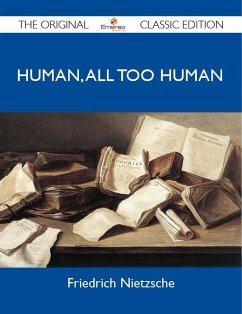Nietzsche is often said to have entered a new period with the publication of Human All Too Human and the book is considerably more positivistic than his earlier writings. It aims at debunking unwarranted assumptions more than at defending a grand interpretation of its own, and it marks the high point of Nietzsches interest in, and applause for, natural science.
Nietzsche describes what he means by free spirits in the preface to the second edition of Human All Too Human. Free spirits contrast with the typical human being of his era, who was, as the title suggests, all too human. Free spirits in contrast, are ideal companions that do not yet exist but may appear in the future. They are those who have freed themselves from the chains of the dominant culture, even from the bonds of reverence for those things they once found most praiseworthy. The dangerous period of the free spirit is introduced by the desire to flee whatever has been ones previous spiritual world, a desire that leads to a reconsideration of matters that previously had been taken for granted. The ultimate aim of this liberation is independent self-mastery and supreme health in a life of continual experimentation and adventure.
Human All Too Human is the first published work in which Nietzsche defends his famed perspectivism, the view that truths are one and all interpretations are thus formulated from particular perspectives. This perspectivism figures importantly in his debunking critique of morality which is first presented in Human All Too Human. Nietzsche denies that morality is anything but perspectival. Contrary to the claims of moralists, morality is not inherent in or determined by reality. It is, in fact, the invention of human beings. Moreover, morality has not been the same in every culture and at every time. Nietzsche explicitly contrasts Christian and Greek moral thought, typically claiming that Greek thought had been vastly superior.
Nietzsche, himself, considered the book a breakthrough because it openly articulated his unconventional conclusions for the first time. It also sealed the break with Richard Wagner, who received the book in silence. Nietzsche also considered himself to have moved far beyond Schopenhauerian metaphysics at this point in his life.
Human All Too Human was also the first of Nietzsches published aphoristic works, where prior publications had been in the form of essays or similarly structured works.
Nietzsche describes what he means by free spirits in the preface to the second edition of Human All Too Human. Free spirits contrast with the typical human being of his era, who was, as the title suggests, all too human. Free spirits in contrast, are ideal companions that do not yet exist but may appear in the future. They are those who have freed themselves from the chains of the dominant culture, even from the bonds of reverence for those things they once found most praiseworthy. The dangerous period of the free spirit is introduced by the desire to flee whatever has been ones previous spiritual world, a desire that leads to a reconsideration of matters that previously had been taken for granted. The ultimate aim of this liberation is independent self-mastery and supreme health in a life of continual experimentation and adventure.
Human All Too Human is the first published work in which Nietzsche defends his famed perspectivism, the view that truths are one and all interpretations are thus formulated from particular perspectives. This perspectivism figures importantly in his debunking critique of morality which is first presented in Human All Too Human. Nietzsche denies that morality is anything but perspectival. Contrary to the claims of moralists, morality is not inherent in or determined by reality. It is, in fact, the invention of human beings. Moreover, morality has not been the same in every culture and at every time. Nietzsche explicitly contrasts Christian and Greek moral thought, typically claiming that Greek thought had been vastly superior.
Nietzsche, himself, considered the book a breakthrough because it openly articulated his unconventional conclusions for the first time. It also sealed the break with Richard Wagner, who received the book in silence. Nietzsche also considered himself to have moved far beyond Schopenhauerian metaphysics at this point in his life.
Human All Too Human was also the first of Nietzsches published aphoristic works, where prior publications had been in the form of essays or similarly structured works.
Dieser Download kann aus rechtlichen Gründen nur mit Rechnungsadresse in A, D ausgeliefert werden.


